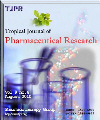
|
Tropical Journal of Pharmaceutical Research
Pharmacotherapy Group, Faculty of Pharmacy, University of Benin, Benin City, Nigeria
ISSN: 1596-5996
EISSN: 1596-5996
Vol. 16, No. 6, 2017, pp. 1317-1323
|
 Bioline Code: pr17168
Bioline Code: pr17168
Full paper language: English
Document type: Research Article
Document available free of charge
|
|
|
Tropical Journal of Pharmaceutical Research, Vol. 16, No. 6, 2017, pp. 1317-1323
| en |
Mesenchymal stem cells promote incision wound repair in a mouse model
Li, Dong-Jie; Shen, Chuan-An; Sun, Tian-Jun; Zhang, Lin; Deng, Hu-Ping & Chai, Jia-Ke
Abstract
Purpose: To investigate the wound healing process via the application of mesenchymal stem cells
(MSCs) in a mouse model.
Methods: MSCs were collected from the bone marrow of the femur and tibia of 6 – 12-week-old
C57BL/6 mice. Full-thickness cutaneous wounds (4 × 2 cm) were made by incision on the dorsal side of
the mice. The wound was then subjected to one of four random treatments: phosphate-buffered saline
(PBS) solution, 3T3 fibroblasts, naive MSCs, or interferon gamma-activated MSCs. Chalkley method
was used to determine vascular density. A score was given, for each field examined, for CD31-positive
areas, and the results of blind analysis were confirmed by independent analysis of a second evaluator.
Results: The tensile strength of the wound area was significantly lower in older versus younger mice (p
≤ 0.0007). Only one quarter of the mean force was required to disrupt wound integrity in older mice
compared to young mice. Treatment with MSCs showed positive effects on wound healing. Activated
MSCs showed the greatest efficacy at a dosage of 5 × 104 activated MSCs/8 cm2 of wound area or 6,
250 cells/cm2.
Conclusion: The results suggest that MSC therapies enhance the tissue regeneration capacity in mice,
especially in older populations, through effective transdifferentiation into the epithelium.
Keywords
Mesenchymal stem cell; wound healing; mouse
|
| |
© Copyright 2017 - Pharmacotherapy Group, Faculty of Pharmacy, University of Benin, Benin City, 300001 Nigeria.
Alternative site location: http://www.tjpr.org
|
|
